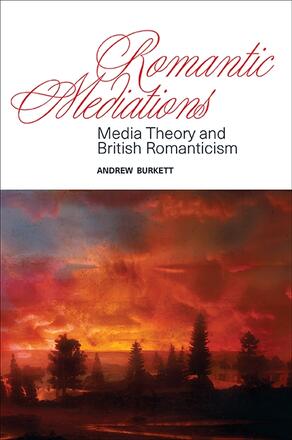
Romantic Mediations
Media Theory and British Romanticism
Alternative formats available from:
Investigates the ways in which new technologies and theories of photography, phonography, moving images, and digital media engage with a diverse set of texts by British Romantic writers.
Description
Finalist in the 2016 Foreword INDIES Book of the Year Award in the Social Sciences category
Romantic Mediations investigates the connections among British Romantic writers, their texts, and the history of major forms of technical media from the turn of the nineteenth century to the present. Opening up the vital new subfield of Romantic media studies through interventions in both media archaeology and contemporary media theory, Andrew Burkett addresses the ways that unconventional techniques and theories of storage and processing media engage with classic texts by William Blake, Lord Byron, John Keats, Mary Wollstonecraft Shelley, and others. Ordered chronologically and structured by four crucial though often overlooked case studies that delve into Romanticism's role in the histories of incipient technical media systems, the book focuses on different examples of the ways that imaginative literature and art of the period become taken up and transformed by—while simultaneously shaping considerably—new media environments and platforms of photography, phonography, moving images, and digital media.
Andrew Burkett is Assistant Professor of English at Union College.
Reviews
"Romantic Mediations lays the groundwork for future studies of the afterlives of Romanticism in other media and the ways those manifestations in turn reveal essential conditions of the writings they refract … [and] adds to our understanding of the ways English Studies can recognize and replenish itself in the history and theory of media. " — Studies in Romanticism
"Andrew Burkett's book is a masterful study of the possibilities of a media theory of Romanticism. With media archaeology at its centre, Burkett maps out the entire theoretical field, while at the same time providing thought-provoking and striking new insights into specific Romantic writers, their preoccupations, and practices. " — The BARS Review
"…Burkett's book is in turns insightful, penetrating, speculative, and engaging as a media history that unearths conceptual linkage between the old and new, in particular between romantic art and literature and contemporary media technologies of storage and processing … Burkett's clear structure and deft handling of difficult concepts make for a thoroughly engaging read for romanticists and historians of various disciplinary stripes. " — Journal of British Studies
"…theoretically rich and conceptually complex … For scholars who want to be challenged to think about familiar texts in new ways, to see those texts through the lenses of twenty-first-century media-centered and technological concerns, Burkett's monograph … will be stimulating. " — European Romantic Review
"…Burkett's book articulates a new and refreshing approach to Romantic media studies. By opening new pathways and situating Romanticism in longer media histories that reach our own current multimedia moment, Burkett calls on scholars to further explore 'the potential of media archaeology for the Romantic text and its long afterlife, which haunts us even today. ' In concluding an engaging and lively work, this call to action invites a resounding answer. " — Review 19
"Romantic Mediations brings contemporary media theory to major Romantic texts and their reception. Few if any scholars working in Romanticism and media have taken up the generational difference between Friedrich Kittler's media theory and the more contemporary media archaeology of Jussi Parikka. Moreover, too often have media theories of Romanticism been restricted to digital media and screen technology. Andrew Burkett creates a new path for Romantic period scholarship by showing the potential of media archaeology for Romantic texts and their long afterlife. " — Ron Broglio, author of Technologies of the Picturesque: British Art, Poetry, and Instruments 1750–1830